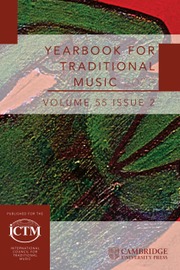This issue of the Yearbook for Traditional Music is dedicated to showcasing articles derived from presentations made at the 46th World Conference of the ICTM, held in Lisbon in July 2022. The conference was hosted by the University NOVA de Lisboa and organized by the Institute of Ethnomusicology—Center for Research in Music and Dance (INET-md). Unprecedented in the history of the ICTM, the biennial conference necessitated a one-year postponement due to the SARS COVID-19 pandemic. In response to rapidly changing restrictions and ambivalence about travel, the conference adopted a hybrid mode of operation for the first time in ICTM’s history. Our gathering attracted a total of 712 participants, comprised of 452 in-person and 260 online attendees, representing 77 countries.
The incorporation of a bilingual publication in this issue revives a practice from early editions of the Yearbook, where texts were originally presented in the authors’ native languages. In this issue, one article is also published in Portuguese, marking a noteworthy step by ICTMD to integrate languages other than English into its publications.
In the first article, Keith Howard and Cholong Sung detail the musical experiences of eighteen North Koreans who currently reside in Britain, most having arrived there between 2004 and 2008. Music-related images and materials that are released by North Korean state outlets are difficult to trust, and unsurveilled fieldwork is impossible, making the testimonies of ordinary North Koreans particularly valuable. The voices of North Korean migrants confirm a restrictive and tightly controlled diet of music and dance, subject to the propagandist aims of the Kim dynasty.
Yao Cui’s article explores Chinese instrumental music education in Toronto, a multicultural city with a sizeable Chinese migrant community. The author compares the methods of teaching musical instruments in China with their adaptation by the Chinese community in Toronto. Grounded in studies of migrant music and based on fieldwork carried out in universities, Chinese music ensembles, and private studios, the author argues for the significance of teaching Chinese musical instruments in preserving community cohesion and strengthening connections between the place of origin and the host environment. Cui notes that the decline in public support poses a risk to Chinese-Canadian cultural heritage, prompting consideration of community-based initiatives to ensure the continued transmission of cultural inheritance, particularly in music.
Giorgia Pinzauti’s article delves into a case of artivism (i.e., arts activism) that emerged in 2019 in Chile through the efforts of the feminist collective Las Tesis, serving as a form of resistance against a repressive political regime. The performance titled “Un Violador en tu Camino” (A Rapist in Your Path) rapidly spread to various countries and continents, particularly in situations of oppression against women, showcasing distinctive forms of adaptability. The author scrutinizes how, in diverse contexts, the performance adjusted to different languages and musical scenarios, evolving into a global movement for political resistance against patriarchy. This movement was further amplified through social media and other methods of internet dissemination.
Joseph Kunnuji’s article examines the social positionality of Ogu people who, by virtue of the colonial imposition of national borders, now reside in Lagos State, Nigeria. There they occupy a marginal position—politically, economically, linguistically—by virtue of living alongside a Yorùbá majority. Ogu women especially, Kunnuji argues, are vulnerable to the hegemonic presence of residual Western and Yoruba patriarchies. He identifies gangbe, an Ogu married-women’s musical genre, as a singular site for demonstrating their creative agency and potentially reasserting the powerful position held by Ogu women in the precolonial era.
The text in Portuguese, authored by Marco Roque de Freitas, explores the impact of the World Music market on the international stage on Mozambique’s music industry. This impact was particularly notable during the postcolonial construction of the nation, marked by the transition from a single-party regime to a liberal regime (1987–94). Through three case studies encompassing a performative genre (marrabenta), a song (“Baila Maria”), and two albums—Eyuphuro and Ghorwane by Real World Records—Freitas employs a detailed ethnographic study and meticulous musical analysis to illuminate the dual nature of the World Music market. It served as a launching pad for Mozambican musicians in the international arena, granting them a professional status previously unfamiliar. However, it also shaped the conditions of their creativity, which became subject to market laws, and instrumentalized the music and the musicians. These processes veiled the country’s wartime situation through state surveillance while, at other times, it fulfilled a nationalist mission of the country’s sonic representation on the international stage.
Many narratives emerging from the COVID-19 pandemic attest to an initial silencing of musical voices, followed by remote resoundings made possible by technology. Presenting an alternative narrative, Jessie Vallejo’s article chronicles the dramatic rise in in-person mariachi performances in the Greater Los Angeles (GLA) area from May 2020 to late 2022. This mobilization occurred because of and in the face of devastating COVID-19 morbidity rates for Latinx people in the GLA—a function of historically discriminatory practices against a racialized population. As a mariachi musician, Vallejo writes a testimonio in the first person, detailing how the community of mariachis found and offered support through music.
As editors, we would like to offer our sincere thanks to the numerous reviewers who provided thoughtful, constructive feedback to all who submitted manuscripts for consideration. We cannot thank them enough for their invaluable service to our discipline.




